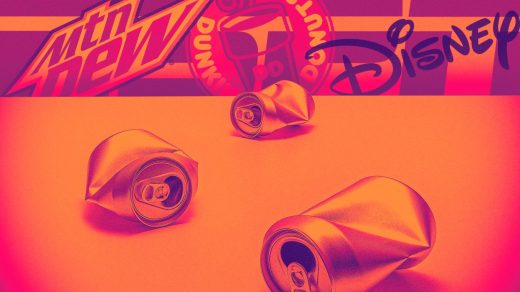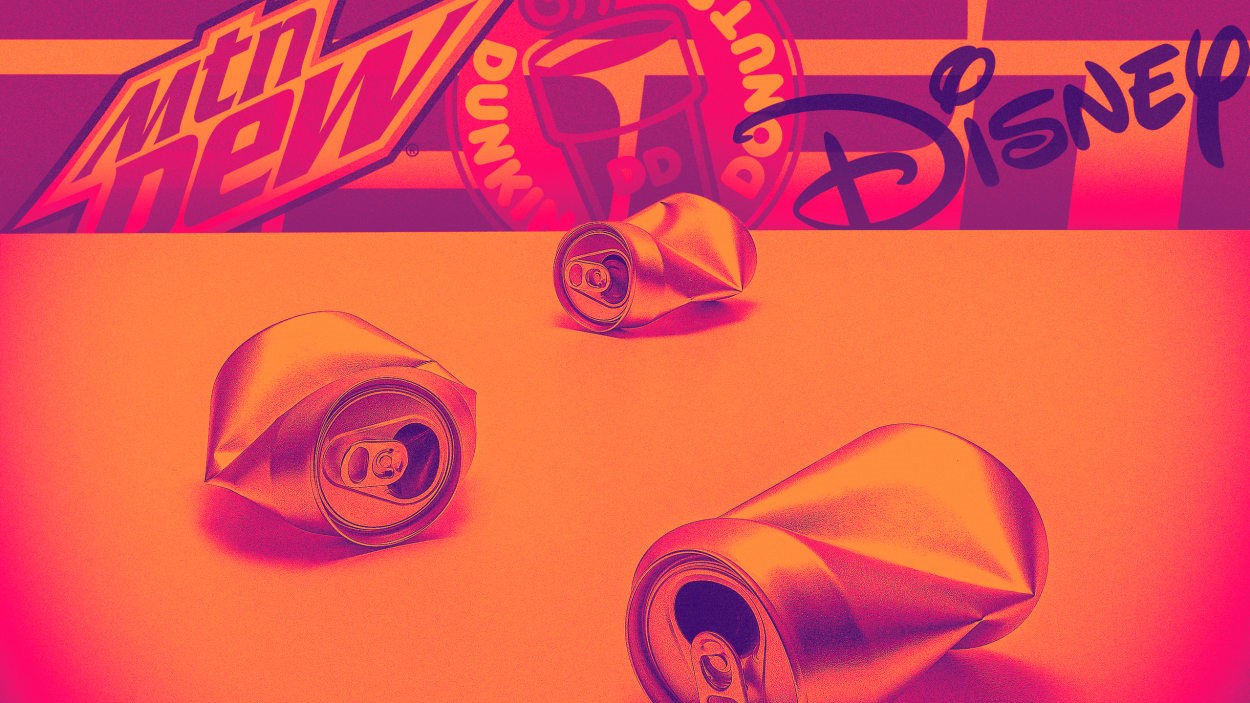Disney, ESPN, Mtn Dew, Dunkin’, and the danger of gambling with an A-list brand
By Jeff Beer
Earlier this week, I was forced to drink a black cherry-flavored Hard Mtn Dew. Okay, forced is an exaggeration—the specifics aren’t important—but it may or may not have involved the fact that it was quite literally the only drink containing alcohol left in the house.
Poured into a glass over ice, my first thought was that it should be called Barbie’s Black Cherry, thanks to its specific pink hue and the fact that Mattel’s reigning queen has been stamped on just about everything this summer. The taste is not complicated: Imagine a boozy melted popsicle. Or, y’know, a vodka and black cherry Mtn Dew.
My second thought was, Why in the world does this exist?
The value of strong brand equity has never been higher. Our collective attention has never been more fragmented, so the brands that can attract and retain both our attention and affection are the ones that consistently break through the noise. These are the brands that can credibly claim to have actual fans, and they leverage that fandom to create advertising and products aimed at stoking and further spreading that loyalty.
This has led to an explosion in collaboration culture, as brands attempt to feed off each other, using their respective brand equity to boost the other’s. Rising tides, floating boats, and all that. Doritos and Taco Bell. Supreme and Oreo. McDonald’s and BTS. This current moment has been about combining fandoms to create new consumers. Just this week, Heinz and the home decor brand Lick announced a limited edition ketchup paint color in the U.K. It’s weird, surprising, and brilliant.
But the lowest hanging fruit in the brand equity universe has to be tapping into what analyst and investor Howard Lindzon calls the “degenerate economy,” which revolves around products in categories like gambling and booze. On the former, we have ESPN’s $1.5 billion deal with Penn Entertainment last month, after the gaming company ditched Barstool to try to build its sports betting empire on the back of Disney’s home of SportsCenter. And on the latter, in the past few years store shelves have become flooded with “spiked” versions of household brands, from the understandable Jack & Coke by Jack Daniels and Coca-Cola to Hard Mtn Dew and SunnyD Vodka Seltzer to the most absurd liquor from none other than Eggo Waffles.
Last week, The Wall Street Journal reported that regulators were looking into these brand crossovers and how they might be aimed at younger consumers, given that the bulk of many of these brands’ brand equity has been forged among kids. This is, of course, a serious issue.
Never mind (for a moment) the children, major brands chasing easy money by cashing out brand equity in addictive categories is also short-termism at its finest. In many cases, these craven efforts erode the equity that made them so valuable in the first place.
What, exactly, does a SunnyD Vodka Seltzer add to SunnyD’s brand? It certainly adds to the bottom line, especially during the initial wave of novelty sales. Then what? Sales of Hard Mtn Dew were initially strong, with some analysts thinking it would help boost its parent, The Boston Beer Company. The company’s second quarter results this year, though, haven’t been as encouraging, with sales decreasing. No wonder. Anyone who drinks Hard Mtn Dew on purpose is under the age of 22, doing it as a joke, lost a bet, or a complete f**king idiot. These are the only choices. Are there any studies on that consumer demographic?
Back in May, I spoke to University of Michigan marketing prof and head of strategy at Wieden+Kennedy Marcus Collins. I continually go back to this conversation and his book, For The Culture, because of its clear articulation of the best-case scenario so many brands are aiming for with these brand extensions. When it comes to marketing, Collins said that the zenith of brand strength is when brands are able to transcend the value proposition of its products and find ways to connect with people based on how they see the world. “When brands find themselves connecting at that level, they’re no longer defined by what they do, but why they do it, or how they see the world or their conviction—which from a business perspective, completely opens the aperture on which industry you’re in,” he told me. “If I’m Nike, I’m not in the sneaker industry, I’m in the ‘every human body is an athlete’ industry. So any way that I can support athletes to be the best versions of themselves, that’s the business I’m in. If it’s sneakers, great. If it’s apparel or great technology, great. If it’s film, great.”
So what industry is Mtn Dew in with Hard Mtn Dew? Or Eggo with its Brunch in a Jar Sippin’ Cream liqueur? Adding booze doesn’t count as product innovation, but merely desperation disguised as ambition. Just because you have the equity to extend your brand doesn’t make it invincible. The history of brand extensions is littered with cautionary tales. Anyone remember Hooters Air?
Branching off into apparel, airlines, or restaurants (hello ESPN, again) is one thing. But it’s a much different proposition when that extension is into what has traditionally been called “vice,” and your brand equity isn’t steeped in that world. Bud Light branching out to hard seltzer makes sense. MGM or Caesar’s jumping into sports betting makes sense. For Mtn Dew, which has long been a youth-oriented brand—or ESPN, which is owned by Disney, historically the most focused and family-friendly company in modern times—to stake their consumer appeal on these more adult activities is a much bigger, well, gamble.
This is not an argument for prudishness or one about the potential destruction of brand value—or even about misunderstanding the source and application of brand power (though it is that, as well). There are actual harms that can befall customers, not just spreadsheets. A recent study by the Centers for Disease Control and Prevention (CDC) found that one in eight American deaths of people ages 20 to 64 were the result of excessive alcohol use. If your brand’s core business isn’t already in alcohol, there is questionable risk in lending its equity to one of the country’s leading causes of preventable death. You ever listen to the disclaimer at the end of an ad for an online betting service? That isn’t just “the state made us add this at the end” boilerplate, but a rather stark acknowledgment of the risks of becoming addicted to gambling. Disney superfans are supposed to be obsessed with Pluto, not parlays; Spider-Man, not survivor pools.
The sad fact is that the money is just too easy, and these moves are a low-cost play (at least in terms of outlay) for marketers. It costs less for an existing brand to raise awareness in a category like alcohol, and it represents a quick way to profit from the overall growth in hard seltzers and canned cocktails, which represent a combined $22 billion market this year. After all, greedflation and shrinkflation have already been exposed, so the last refuge of the scoundrel to boost short-term revenue is a greediness of another stripe.
Sounds like a no-brainer, right? But what brands need to remember is that after the high that comes from drinking a black cherry-flavored Hard Mtn Dew, the headache is devastating.
(14)



